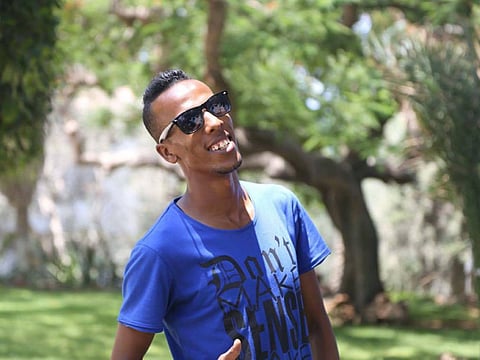Black Palestinians face subtle racism in Gaza
Obaid, who believes his ancestors came from Sudan, says he has to work twice as hard to prove himself

Gaza: Black Palestinians constitute a minority of one per cent of the total population of the two million inhabitants living in Gaza Strip.
While its is difficult to accurately pin their exact origins, many say they came from Ghana, Sudan and Egypt — or at least that’s what has been passed down through their oral history.
Many first came to Palestine during the Islamic conquests as slaves to serve their owners in the seventh century.
It is also reported that another wave of Africans emigrated to Palestine in the late 19th century to work as merchants or fighters under the rule of the Ottoman Empire.
Despite their deep roots in Palestine, many still encounter racism and discrimination, although it is to a much less degree as how poorly people of colour are treated in other countries — particularly the US.
Mohammad Obaid, 26, a folklore dancer and founder of the Dabke Club for children, thinks his ancestors originally came from Sudan.
“My grandparents worked as merchants in 1948 areas, which is considered Beersheba in Israel today. They were displaced when Israel was created and we have lived in Gaza ever since,” he told Gulf News.
At least 11,000 black Palestinians live in Al Jalla’a district of Gaza in a neighbourhood called “Al Abeed” which means slaves in Arabic.
Among friends and co-workers, Obaid is known as Samara — which means dark skinned.
“I am proud of who I am, so I don’t take it in a bad way,” he said.
“I consider it to be a distinguished nickname which gives a special flavour to my personality.”
Although there is no official discriminatory policy against black Palestinians, Obaid says that subtle racism makes his life more difficult than lighter skinned Palestinians.
“If I wasn’t the best dancer, I wouldn’t be on the Dabke team,” he said.
“I always have to prove myself twice as much as others.”
Many black Palestinians are not considered for jobs that require direct communication or interaction with customers.
The majority of Palestinians do not marry black Palestinians, although recently there have been some changes in mentality.
“Where I live, people accept to marry black Palestinians, but in other areas it is strictly forbidden,” he said.
It is worse for black Palestinian women — while dark-skinned men may be able to marry light-skinned Palestinians, the reverse is mostly not accepted.
“I knew a couple who were in love but the father of the would-be groom threatened to renounce him in the newspapers. Sadly, they separated,” he said.
And Obaid says the security forces have been recently very harsh on black Palestinians.
When the cops pulled him and his friends over recently, he was the only one from the passengers pulled out for further security checks.
He took his anger out by writing a poem directed at the police entitled “Blacks are not security suspects”.
Despite facing bouts of racism, he said he never thought about leaving Gaza until recently.
“The police treatment has gotten worse, so for the first time I thought about leaving.”
But for Karama, a 34-year-old Palestinian woman, who has a black father and white mother, race has never gotten in the way of her success.
“I personally haven’t experienced any discrimination,” she told Gulf News.
“Blacks are sometimes preferred by some organisations who seek diversity.”
Karama has participated and led many different social work initiatives and ceremonies, but she acknowledges that having a white mother could be the reason.
“I know in other areas of Gaza, people are not as accepting.”


